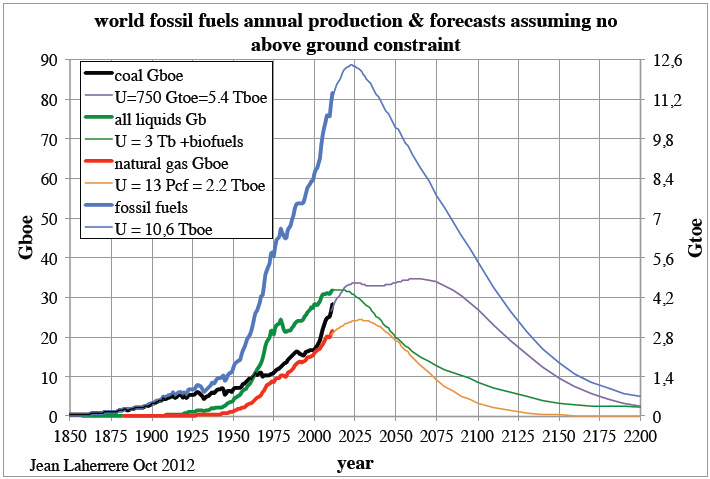by Pedro
27 February 2014
Peak Oil, Peak Gas, Peak Everything
Peak Oil

Global oil discovery peaked in the late 1960s. Since the mid-1980s, oil companies have been finding less oil than we have been consuming.
Resilience.org's Peak Oil Primer gives the following definition of peak oil:
"Peak oil is the simplest label for the problem of energy resource depletion, or more specifically, the peak in global oil production. Oil is a finite, non-renewable resource, one that has powered phenomenal economic and population growth over the last century and a half. The rate of oil 'production', meaning extraction and refining (currently about 85 million barrels/day), has grown almost every year of the last century. Once we have used up about half of the original reserves, oil production becomes ever more likely stop growing and begin a terminal decline, hence 'peak'. The peak in oil production does not signify 'running out of oil', but it does mean the end of cheap oil, as we switch from a buyers' to a sellers' market. For economies leveraged on ever increasing quantities of cheap oil, the consequences may be dire. Without significant successful cultural reform, severe economic and social consequences seem inevitable."
Conventional crude oil production peaked in 2006 [1], This peak pushed oil prices up from $20 a barrel in 2001 to $100 a barrel by 2008. The price increase almost certainly caused the global economic crisis, which started to become apparent in 2008 [2].
Since then, major investment has gone into unconventional oil extraction techniques, such as hydraulic fracturing ('fracking') and tar sands. These techniques have been available for years, but only became economically viable when oil prices increased to $100 a barrel. Fracking has offset some of the impact of peak oil, but fracked oil is expected to peak over the next few years [3][4].
Peak fossil fuels
All fossil fuels are finite and many forecasters predict a peak in all fossil fuels within the next decade or so [5][6]. Whilst this is likely to be crippling to the economy, it is not going to save us from climate change.
Even if fossil fuels peaked today, we have only burned about half of the fossil fuels and many of the remaining resources are much dirtier than those we were burning last century. The rate of consumption of fossil fuels will decrease, but nowhere near enough to prevent catastophic climate change.
Peak everything
Fossil fuels are not the only resources close to their limits. Many resources are believed to be close to peak: various metals, phosphorous (for fertilisers), drinking water, and rare minerals (often required for 'green' technology).
The exploition of fossil fuels and other resources has enabled a massive increase in worldwide population, through large scale mechanisation of agriculture, chemical fertilizers and pesticides, transportation, refridgeration, packaging, medicines, and various other technologies. Before the industrial revolution, the world population remained fairly stable, below 1 billion for thousands of years. Since then, the population has grown rapidly, doubling every 35 years, reaching 7 billion a few years ago.
The population in most industrialised nations rose rapidly last century and is now levelling off, whilst population in developing nations is still catching up. With less fossil fuels, it is going to become increasingly challenging to feed the world's population. With climate change threatening food supplies, the challenge becomes even more daunting.
All of this points to one thing: growth cannot continue indefinitely. We are getting close to the limits of growth and need to change. Today.

About the author
Pedro (Pete Brace) graduated from university with a first class honours degree in Computer Science. He then went on to work in the video games industry for 7 years, soon earning a good salary as a Lead Game Programmer, but living an unfulfiling and unsustainable life. In the end he came to his senses and left his job to find a more sustainable life. He is now very happy living as an eco-peasant at Tinkers' Bubble fossil fuel free community in Somerset, UK, where he earns around 97% less than in his old job. [7]

Notes
1. "Peak oil: just around the corner", Fatih Bitol (International Energy Agency) radio interview, http://www.abc.net.au/radionational/programs/scienceshow/peak-oil-just-around-the-corner/3010606#transcript
2. "Peak Oil and the Great Recession", Tom Whipple, The Post Carbon Reader Series: Energy, http://www.postcarbon.org/Reader/PCReader-Whipple-Oil.pdf
3. "Jean Laherrere uses Hubbert linearization to estimate Bakken shale oil peak in 2014", Matt Mushalik, Crude Oil Peak, http://crudeoilpeak.info/jean-laherrere-uses-hubbert-linearization-to-estimate-bakken-shale-oil-peak-in-2014
4. "Drill Baby Drill: Can unconventional fuels usher in a new era of energy abundance?", David Hughes, The Post Carbon Institute, http://www.postcarbon.org/reports/dbd-report-final.pdf
5. "Projection of World Fossil Fuel Production with Supply and Demand Interactions", Steve Mohr, University of Newcastle, Australia, http://www.theoildrum.com/node/6782
6. "Update On Coal", Louis de Sousa, The Oil Drum, http://www.theoildrum.com/node/9583
7. The views in this article do not necessarily represent the views of other members of Tinkers' Bubble





